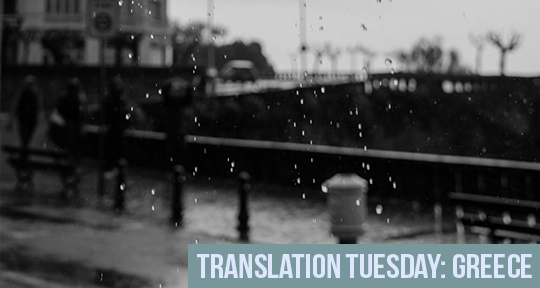This Translation Tuesday, a twisted, rambling screed offers a window into the dark mind of a low-level bank clerk. Obsessed with money, plagued by seedy, morbid memories, buffeted by obscure resentments, he comes across a letter that confirms his paranoid delusions, and begins to plan his ‘perfect crime’. This is a powerful study of madness from the Greek writer Tasos Leivaditis, rendered into a genuinely disturbing English by N. N. Trakakis.
It continued raining, and so I too continued sitting under the porch of a cheap, commonplace hotel in a small cul-de-sac. How I got there is an entire saga, but I would often absent-mindedly find myself in the most unlikely parts of the city, and by ‘absent-mindedly’ I mean absorbed in thoughts that troubled me of late. I was always of course a procrastinator, but this delay had lasted for years and the resolution that had been ordained, from whatever angle you examined it, was not at all in my favour. When I left my boss’ house, in my haste I forgot my one and only coat, but I thought that, rather than trying to clear up such a messy situation, I’d be better off hanging myself. And I may well have done so if this letter hadn’t arrived. “The landlady must have left it on the table,” I thought. A letter that, the more I think about it, the more convinced I become that I had been waiting for it for a long while, it contained moreover so many details regarding my personal life that there couldn’t be any doubt that it was destined for me – despite the fact that people’s morals have slackened so much in our time that they might even call into question the authenticity of a letter, the contents of which would admittedly crush them.
The rain abated, I was ready to leave, then I remembered why I had come, it was the same hotel, many years ago, I might not have even been eighteen, I would often think “my God, if I could at least see one woman naked, then I can die!” but I was also afraid lest I did in fact die, one night it seemed I was hypnotised, a woman approached and brought me here to this hotel, I had no idea how.
“C’mon, get undressed and get in bed,” she told me.
It was winter, I was wearing a khaki scarf which belonged to my grandfather, I remember that it was this very scarf, hanging close at hand on a rack, that we used to bind his jaw as soon as he had died, as was the custom. I took off my jacket and lay down, the woman undressed completely, and I, of course, may as well have been dead, for whether from fear or bad timing nothing was happening. The woman got up.
“If you can’t do it, why hire a hooker?” she said, washing her hands in the basin.
“My apologies, some other time…,” I stammered.
She perhaps thought that I was trying to avoid paying, for she immediately replied:
“The body fell on the bed, it must be paid.”
That expression made an impression on me, in particular its tone: she spoke about her body as though she was referring to someone else, as though she was saying, for example, “the old lady is unwell, it doesn’t look like she’ll make it through the night,” an old lady, in fact, who’s lived her life and made your life miserable with her old-age grumbling – in exactly that way. Then, I don’t know how, I felt a kind of distress, as though they had stuffed my mouth with lots of cotton wool, I then observed the wall next to me: it seemed to tremble at first, then it began to tilt and tilt, until it was about to collapse on me, I rushed to the door and ran down the stairs.
At the exact moment when my boss was angrily showing me the door, I again noticed the wall shaking, “it’s weird how people live in houses like this,” I thought, when I got back home, past midnight, everything was shut, they were asleep, I began forcefully ringing the bell, eventually a window up high opened and that familiar, longish face appeared.


